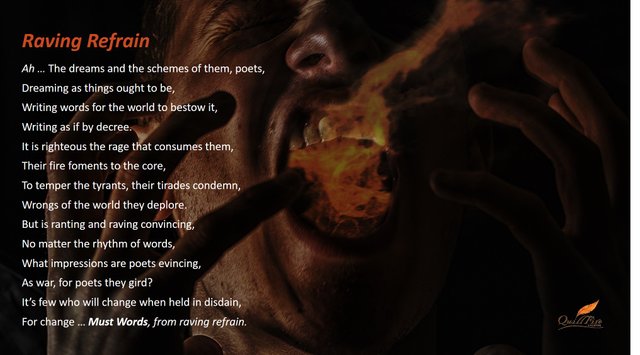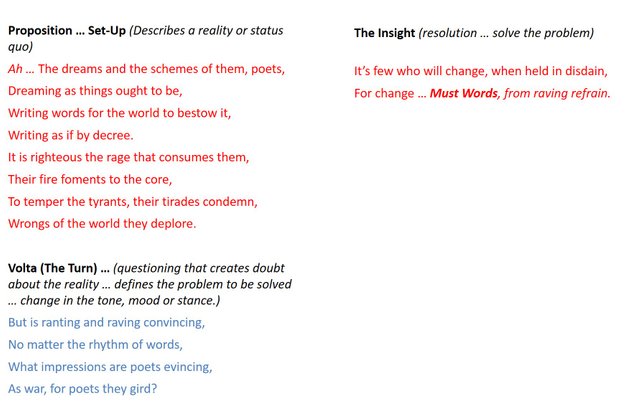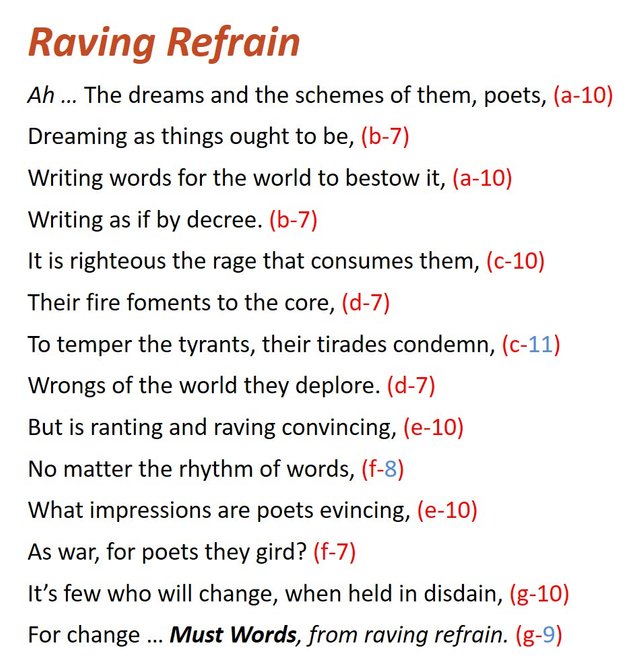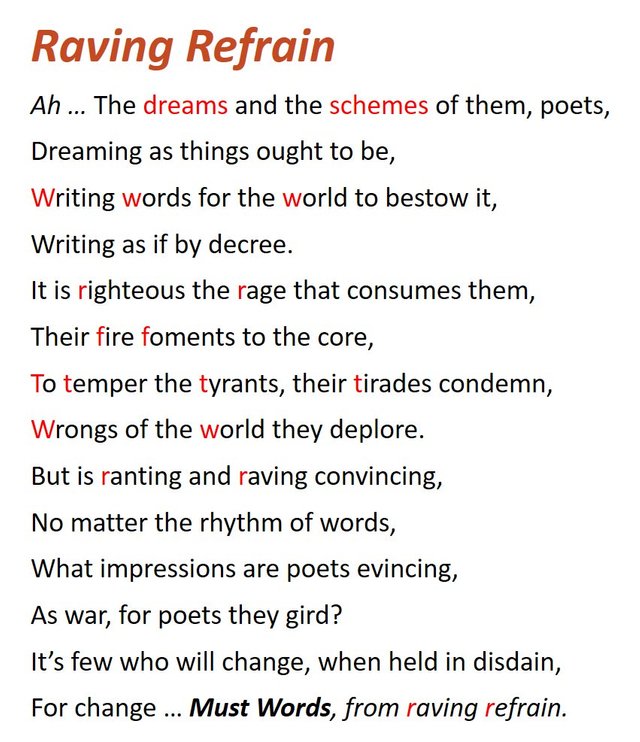"Raving Refrain" (poem) >>> a "Savagerean Sonnet" + Explanation (100 Days of Poetry Contest - Day #5)


That's right, fellow poets, you read the title correctly ... a **_"Savagerean Sonnet._**
For those of who don't know, my surname is Savage and, to the best of my knowledge, I've invented it. Who cares? No one, including myself, rarely use this Verse Form. I find that the only ones who care about a poem being in sonnet form are other poets (even then, most of them don't care) and I target my poetry at the 99.99% of the population who prefer simpler Verse Forms.
The other day I was reading some of the posts in this Contest (I'm a judge in the Intermediate category), and I came across a poem by @ajremy, written as a sonnet. His explanation was that he was here to learn, to improve his craft, and hence his attempt (and a good one at that) to write a poem in one of the more challenging Verse Forms. @ajremy, I take off my hat.
That inspired me to do the same and provide an explanation about its composition.
What is a Sonnet?
Before going any further, a bit of history is in order. Sonnets have a long history in poetry, and they've been adapted from one language to another to exploit the nuances of each. Italian (rhyme-rich) is not the same as English (rhyme-poor) and a sonnet in the former sounds different than a sonnet in the latter.
Here is a nice summary of the two major sonnet forms in history:
Petrarchan Sonnet
The first and most common sonnet is the Petrarchan, or Italian. Named after one of its greatest practitioners, the Italian poet Petrarch, the Petrarchan sonnet is divided into two stanzas, the octave (the first eight lines) followed by the answering sestet (the final six lines). The tightly woven rhyme scheme, abba, abba, cdecde or cdcdcd, is suited for the rhyme-rich Italian language, though there are many fine examples in English.
Since the Petrarchan presents an argument, observation, question, or some other answerable charge in the octave, a turn, or volta, occurs between the eighth and ninth lines. This turn marks a shift in the direction of the foregoing argument or narrative, turning the sestet into the vehicle for the counterargument, clarification, or whatever answer the octave demands.
And secondly, our beloved Shakespearean Sonnet:
Shakespearean Sonnet
The second major type of sonnet, the Shakespearean, or English sonnet, follows a different set of rules. Here, three quatrains and a couplet follow this rhyme scheme: abab, cdcd, efef, gg. The couplet plays a pivotal role, usually arriving in the form of a conclusion, amplification, or even refutation of the previous three stanzas, often creating an epiphanic quality to the end.
The Savagerean Sonnet
The Savagerean Sonnet has three characteristics:
- It utilizes the rhyme scheme of Shakespearean Sonnets to compensate for the rhyme-poor nature of English;
- It re-adopts the "Argument, Volta, Resolution" structure of the Petrarchan Sonnet; and
- It changes the meter of even-numbered lines from ten syllables to seven.
Rationale
The rationale for the first two characteristics are pretty straightforward. Choose a rhyme scheme that is more conducive to English and adopt an Argument Structure that is more conducive to Making An Argument.

Meter Modification
The third characteristic, meter modification, requires more explanation. As I've explained in other posts and comments, the Artistic Effects of poetry are determined by the Biological Processes that underlie them.
Our brains have something called, "Working Memory." Grossly over-simplifying, our Working Memories function like a water clock. Imagine a container attached to a hinge. Into it, you start pouring water. When it gets full, it tips over, dumping its contents. Now empty, it returns to it's starting position and the process starts all over again.
Our working memories can handle 5-9 chunks of information before they must dump (to be processed in other parts of the brain). Again, grossly over-simplifying, what this means in respect to poetry, is the that maximum "Neural Line" is 9 syllables long. That means that readers are "dumping" before the end of a 10-syllable line, dramatically interrupting the "flow." The complete line does NOT get dumped for further processing as a whole, but rather is broken up into bits.
Here's an experiment:
Remember the number sequence: 7-4-2. No problem, right? Why? Because you're well under your working memory's maximum limit of 9 chunks of information. So, you can just keep "refreshing" the sequence. 7-4-2 / 7-4-2 / 7-4-2. You get back to the beginning of the sequence before you're working memory has a chance to "dump" the information.
Now try this.
Remember the sequence: 6-8-9-2-1-7-6-4-8-3. That's 10 numbers. Much harder isn't it? The longer the sequence, the greater the difficulty. Why do you think phone numbers are seven digits long?
The reality is more complicated than explained. My area code is (941). As that number sequence has been committed to long-term memory, it can be recalled as a single chunk of information even though it's comprised of 3 digits. And so, adding it in front of a seven-digit phone number still only counts as 8 chunks of information total.
In sentences, the same thing can occur ... one chunk of information is not always equal to 1 syllable.
Nevertheless, pentameter (a 10 syllable line ... the traditional length of sonnet lines) forces a reader's working memory to operate at, or very near, 100% capacity all the time. That's why reading unfamiliar sonnets is so difficult. You're always stopping and going back and re-reading a line, breaking up the flow. Or, you have to read very slowly in the first place.

By switching to 10/7/10/7 ... your working memory gets to rest every second line.
If you go read my other poems, you'll notice that I typically write in quatrains with 8/6/8/8 meter (Ballad Meter) or 10/7/10/7 meter (Modified Ballad Meter, for lack of better terminology). But look carefully at the 10-syllable lines ... almost all contain a comma, semi-colon or "..." in the middle of the line.
This forces an "early dump." So, what you're actually reading is 5/5 ... 7 ... 5/5 ... 7. But, because the two 5-syllable sequences appear on the same line, you're unaware of my duplicity. :-)
There is Science Behind the Art whether we're aware of it or not.
Note that I marked deviations from the syllable count in blue. Whether you are dogmatic about the syllable count is up to you. No one notices the difference and, to me, the highest priority is ALWAYS writing a good-sounding poem that doesn't sound forced. Towards the end of his career (generally when he is considered to have written his best works), you'll find that Shakespeare became less dogmatic about syllable counts. And ... what's good enough for Shakespeare, is good enough for me. (Still, keep it close.)
Pattern
There are 4 types of pattern primarily used in Verse poetry: Meter; rhythm; rhyme and alliteration.
I explain this in much greater detail in other posts (go back and read through them if you're interested) but, in a nutshell, pattern causes the secretion of dopamine in our brains. Dopamine is responsible for creating focus, holding attention and the formation of long-term memory. It also creates, "Wanting."
If you read my prior poems, you'll notice that I frequently employ "internal rhyme" (rhymes within a single line) in addition to the typical tail-rhymes in lines two and four. I'm FLOODING your brain with dopamine.
In sonnets, however, the rhyme scheme is already pretty complicated and internal rhyme risks overwhelming a reader's ability to keep track of it all. And so, you'll notice how I lean heavily on alliteration instead. (I use internal rhyme in the first line as no rhyme scheme (pattern) has yet been established, and therefore nothing to confuse.)

And so, there it is. The Savagerean Sonnet and the logic of its construction. I hope you learned something of interest that, perhaps, you may be able to employ in your own poetic endeavors.
Let me know what you think in the Comments below.


Hey man!
I'm the same as @derangedvisions - I really don't know a great deal about poetry, although I've been writing it for a couple of years now!
Posts like this are really interesting - to actually learn about the foundations - the science- of something that I'm really passionate about!
A lot of effort went into this post, I love your 'trickery' and the fact you've created your own style in your own way. I have only just found you through this challenge but will enjoy looking through some of your older poems when I have the time to do so.
Loved the actual piece you wrote too.. great work and a perfect example!
Keep up the amazing teachings!
With Love
Hart Floe Poet
<3
@hartfloe,
Thanks for the great comment.
I've noticed your username throughout the comments section and on Discord. I have to apologize for not getting more active in commenting ... I'm a judge in Intermediate and we're still working out the system. We're close to getting it stream-lined but, at this point, it's still pretty time-consuming. Very little sleep. :-) Once we've worked out the kinks, you'll see more of me in the Comments section.
Wow, you got 16 votes on this referenced post! You really are carving out the future of poetry here for sure!
This is brilliant... I feel the need to read this over and over to really soak it in and try my hands on it sometime....
Love it... Great work here!!
@ajremy (the teen with steam for steem)
@ajremy,
@d-pend and I spoke for several hours on the phone the other night. Your name was one we both mentioned as have enormous poetic potential. This is especially impressive given your young age. You possess an instinct for insight.
Keep up the good work ... and study those who have gone before you, just as the Beatles studied Mozart. We call them Great Poets for a reason.
And kudos for even attempting a sonnet. You have my salute.
Wow.. It's so amazing how you think so much of me.. It really gladdens my heart and makes me want to work harder to live up to your expectations of me.
I've always studied works by Shakespeare, Wordsworth, William Blake, Alfred Tennysson etc to improve myself but now that I have so many many good poets like you to learn from on a personal basis, my growth is definitely going to be much faster...
Thanks for the love and support
with love
@ajremy (teen with steam for steem
This is fantastic!
I have been bumbling through writing the odd rhyming verse with no concept of rules. Any use of mete, rhythm or rhyme is completely based on my own intuition and aesthetic about how it flows. It is great to start to learn about these things. Alliteration (which I just looked up) now gives me a name for something I have just started to think a bit more about. It adds to the richness of a basic rhyme, well that is my amateur take on it.
Thanks for the post. I am going to attempt a savagerean sonnet.
@girlbeforemirror,
I would LOVE for you to write a Savagerean Sonnet. You would be only the second person to have ever done so (making it worth ... at least 1 SBD due to its historical nature) and I would be truly honored.
While verse forms greatly constrict what you get to say, they force what you do say ... to be well said. They force you to distill an idea to its essence and find the best way to express it.
They also force you to be honest. Poorly written verse is obvious on its face. Doggerel. While people can quibble about whether a verse poem is an 8 or 9 out of ten, no one's going to say it's a 2, while another says it's a 9. Somehow, despite enormous differences in taste, almost everyone comes to roughly the same conclusion.
Of course, it's always nice to get a second opinion before you publish. So, here's what I do: I have an 18-inch wooden back-scratcher from Hawaii that makes an excellent "truth-compeller." I force my teenage daughter to read the poem, and then give me a score out of a 100 ... while looking me directly in the eyes. That last part is important. As it turns out, many people won't give a sh*t about your latest artistic endeavor and will tell you, "100%," just so they can get back to doing something enjoyable. Don't let them. You're a poet ... you're not supposed to be reasonable. All serious poets require an instrument of coercion, and, a sounding board who cannot escape without a Court Order.
Last tip. If there's one thing I've said until I'm blue in the face (I used to tutor poetry), it is: Meter, rhythm and rhyme do not a great poem make. It's the idea, ideal or insight ... the most powerful of which is an insight. You can't make a silk purse out of a sow's ear. You must have at least an "inkling of a poetic idea before you lift your pen. If not, you'll spend hours congratulating yourself because you rhymed "butt-crack with roof-rack" ... but where are you going with that?
5 minutes of thinking is worth 5 hours of work.
That is an insight that is extremely poetic ... and it was the foundation for the rest of a poem.
Anyway, best of luck and let me know if you need to brainstorm.
Well, I had a go yesterday... You would think a purse made from a cow's ear, while not dainty like silk, would still serve as a sturdy pouch, not a delicate one, but secure.
I learned very quickly just how restrictive the structure is. I couldn't contain anything of merit in my makeshift sonnet pocket. It all just fell through. I ended up drawing a word association word salad picture, and scribbling a really crappy Limerick or 3.
I did do a lot of reading and on the topic of sonnets. I have so much to learn and am very grateful for that.
I had no idea how structured Shakespeare was for instance, I knew he did the rhyming turn around at the end of scene, but as for the structure of his writing... Man! I Wonder if I unlearned that or if I just didn't pay enough attention at school.
We studied the Scottish Play in our final year. We focused so much on interpreting the story and grasping the themes, I don't recall too much discussion about the poetic structure, which astounds me now.
I will have to revisit it, I have those witches rolling in my head now, where shall we three meet... In thunder lightning or in rain, when the hurly burly's done when the battles lost and won...Fair is foul, and foul is fair, hover through fog and filthy air.
I only know the first scene...😂 We were divided into groups in our class and had to perform one scene... I was so afraid of speaking in front of the class that I learnt that over and over. I was teamed up with 2 equally unenthusiastic girls, it was abysmal.
I did fool one arrogant hipster once though, just by chance. They opened up a copy and I rattled off the scene1 act 1. I am an unexpected thespian, his jaw dropped. I let him believe I knew the whole thing. It is a very short scene, that opening scene. ☺.
I will definitely do a savage sonnet, I just humbly accept that I will not smash it out and complete it in one day. That was a valuable personal lesson as well as a literary one. Spinning unstructured words is one thing, forming those into art... I have much to learn.
Thank you Mr Savage, you are a fine teacher.
PS. I am going to use buttcrack, roof rack. Actually, I did use butt the other day in a poem, classy .
@girlbeforemirror,
First of all ... Paul.
Secondly, great comment. If I could upvote you by $5, I would. I can't. So you'll have to find beauty and meaning in the singularity of my one penniness.
Sonnets are tough. They're the deep end of the pool. Not only do you have to structure meter, rhythm and rhyme, but also the telling of the story.
Practice makes perfect (and frustrated). :-)
Anyway, the world has more need for purses made of leather, than those made of silk.
BTW: I am waiting with baited breath for any poem containing "buttcrack" and "roofrack."
Great work man, I wish to learn more from you.
@sir.skillful1,
Thanks mate. We all learn from each other. That's why we're here.
I like this, but I'm not sure about the name.
@blockurator,
I'm a slave to alliteration. :-)
Quill
Ha ha We're all a slave of something. Your choice is a good one.